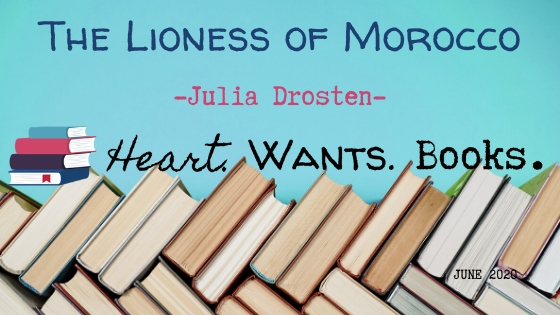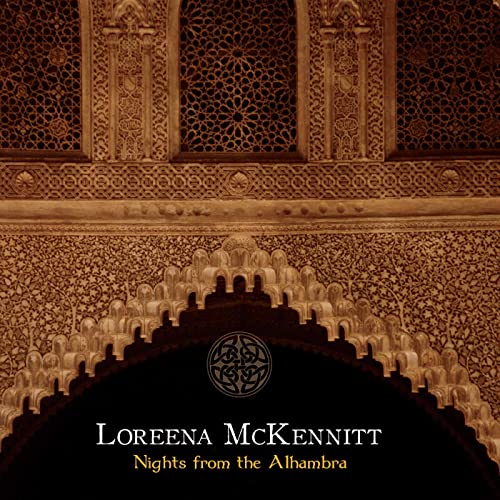The Lioness of Morocco by Julia Drosten June 18, 2020

The following post includes affiliate links. More details here.

Join us at 7:30pm Central Time on (next) Friday 26 June to find out if we managed to finish the book club book neither of us have started yet, and to discuss Deanna Raybourn’s A Curious Beginning (A Veronica Speedwell Mystery Book 1). If you’re ready to sign up, you can do so here.
Sometimes no expectations are the best expectations and help you find a gem of a book! Such was my experience with The Lioness of Morocco by Julia Drotsen. I’d heard of the book, with no recollection how, and it was available on Kindle Unlimited with good ratings and lots of them (close to 3,000, averaging 4.5 stars), so it looked like it was worth a try, and I absolutely adored the setting of the last book I attempted to read set in Morocco. That might be the last book I DNFed, because Ashley advised because I was complaining about all the characters and only appreciating the setting. It was the right call. This was so much more fun than the first third of that book (which was more than I should have read in that book).

Ashley and I have been referring to this book as “lioness” which brings me so much joy because it reminds me of Tamora Pierce’s Song of the Lioness quartet which I love! However, back to The Lioness of Morocco, Sibylla and Alanna are both headstrong women who know what they want and go after it with all they’ve got. But this isn’t about Alanna, it’s about Sibylla who, when the book opens, is a single, 23 year-old-woman in nineteenth century London. She is a voracious reader who’s interested in adventure and struggles with the expectations of her upper-middle class merchant family. Sibylla sees an opportunity in Benjamin Hopkins (who sees an opportunity in her) and they marry and go off to Morocco on an adventure (Sibylla) while pursuing business (Benjamin) on her father’s behalf. This may seem spoilery, but the title says she’s going to Morocco and the details of the set up are comical. Sibylla’s acclamation to Morocco is easy and her life has such depth. There is drama and intrigue in the pages while we explore relationships with Moroccans and Europeans alike. She travels with a caravan, spending days crossing the desert and she befriends the women of the local leader’s harem, even brokering trade deals with women no man is allowed to see, other than the qaid (local leader) or his eunuchs.
The Lioness of Morocco is a book in translation, which isn’t common for me, but it didn’t feel any different. It was translated from German, which I thought was interesting for a book set in London and Morocco. It does include romance, but I would put it solidly in the historical fiction category. Most of the intimate scenes are off camera, although some are described with very little detail. The women of the harem are not shy about discussing intimate relations or personal grooming, which I found refreshing because such conversations are only awkward if we let them be awkward.
There were parts that weren’t everything I wanted them to be, despite me giving this book a solid 4 stars. There is a bit of a mystery that starts during the last 30% of the book that felt like it was reaching too far, especially when the details are revealed closer to the end. Shockingly for me, I didn’t mind the 20 year jump we made from Part One to Part Two. Most of the relevant pieces come out through the narrative, so it works. I also feel like there would be more drama as some of the Europeans socialize with the Moroccans, especially as Sibylla’s children befriend children of other religions, but there is no indication it was a big deal (which is perhaps my biggest issue with the text – it feels like it would have been a big deal at the time, and perhaps even now). Maybe I am just making more of it than would have happened in Mogador with all of the different cultures and faith groups who resided in the city at the time. One can hope!
There are stories throughout history of women rising up to be leaders, despite the fact that most were not permitted to do such things. I thoroughly enjoyed this new-to-me tale, which depicted a woman who was about to age out of the marriage mart choosing her spouse, setting her course, and becoming even more of her own person. Sibylla found her place in the world and made a home for her family there. A story well-told about such a woman, or such a person really, is always welcome in my hands! I hope you also find joy and hope in The Lioness of Morocco.
~Nikki

Julia Drosten is the pen name of German husband and wife writing duo Julia and Horst Drosten. They have written 9 novels, 3 of which have been translated into English, all of which are currently available as Kindle ebooks. The Lioness of Morocco, Die Löwin von Mogador, is an Amazon bestseller in Germany and their first book translated into English. The translation was completed by Christiane Galvani, a professional translator and adjunct professor at Houston Community College in Texas. They focus on historical fiction, and only one of their books is set in present day Berlin.
We chose this book for it’s availability during our Kindle Unlimited subscription, as a book in translation, and for it being set in a place not populated by white people [even though we realize the titular character is actually an English woman]. Overall, I will give this title 3.5 stars, I thoroughly enjoyed the setting and the relationships between the European merchant class and the native Moroccans in Mogador. I had a bit of trouble with the cadence of the language, both of the narration and dialogue. I suspect it is because of the limitations of translation, but the word choices seem juvenile and limited in their ability to describe things in a more poetic fashion. I was also disappointed in several plot device choices. There really is no need to say what they were, it was just a very obvious choice at every turn to any advanced reader, and I am not only speaking of the mystery aspect that Nikki mentioned above.

If you would like to join us in our armchair travels, I highly suggest an immersive experience. A most excellent, and unofficial, soundtrack to this book would be Loreena McKennitt’s Nights From the Alhambra, a 2006 live recording at the Alhambra in Granada, Spain. You can check out the video from her YouTube channel to see this amazing example of Byzantine architecture and hear Caravanserai, a tune with which to imagine travelling on a camel through the desert.
~Ashley


